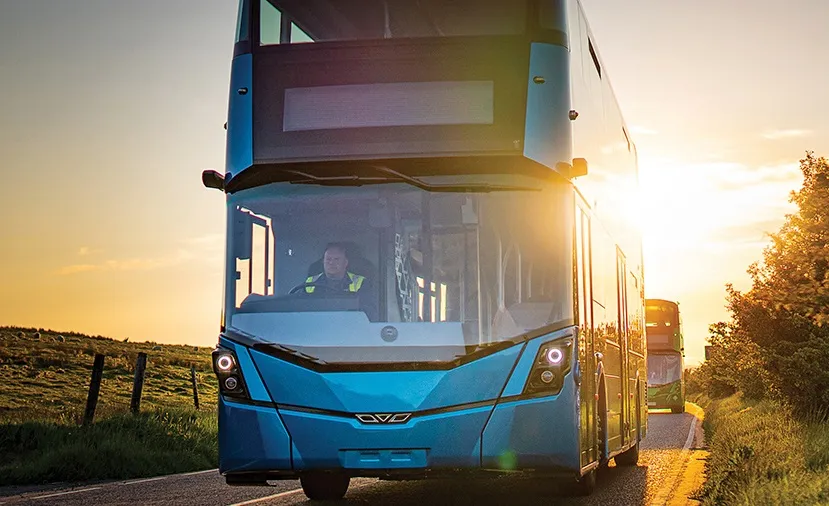The UK chancellor announced in his spring budget what he called the biggest investment, US$87.5 billion (£61 billion), in transport infrastructure in generations and is increasing capital investment in the transport network by 50 per cent over this Parliament compared to the last.
The government plans to establish the UK as a global centre for excellence in connected and autonomous vehicles by establishing a US$24.1 million (£15 million) ‘connected corridor’ from London to Dover to enable vehicles to com
March 17, 2016
Read time: 3 mins
The UK chancellor announced in his spring budget what he called the biggest investment, US$87.5 billion (£61 billion), in transport infrastructure in generations and is increasing capital investment in the transport network by 50 per cent over this Parliament compared to the last.
The government plans to establish the UK as a global centre for excellence in connected and autonomous vehicles by establishing a US$24.1 million (£15 million) ‘connected corridor’ from London to Dover to enable vehicles to communicate wirelessly with infrastructure and potentially other vehicles.
It will also consult this summer on sweeping away regulatory barriers to enable autonomous vehicles on England’s major roads and will conduct trials of driverless cars on the strategic road network by 2017, as well as carrying out trials of truck platooning.
In addition, US$86 million (£60 million) has been allocated to the HS3 rail link to cut journey times to around 30 minutes between Leeds and Manchester and US$114 million (£80 million) to Crossrail 2 which will connect south-west and north-east London.
Among other infrastructure investment is an extra US$230 million (£161 million) to accelerate the transformation of the M62 and US$107 million (£75 million) to improve other road links across the North including the A66 and A69. Funding was also allocated to transformative local transport projects, the Pothole Action Fund and repairs to roads and bridges damaged by Storms Desmond and Eva.
Matt Simmons, director of163 Inrix, said, “George Osborne’s 2016 budget took critical steps to ease the UK’s traffic problem. By approving Crossrail2, the government is making a bold move to reduce congestion in the capital. Backing the HS3 rail link is likely to have a positive impact on traffic levels in Manchester, which is comfortably the second most congested UK city.
“The government’s decision to give the green light to a trial of driverless cars on the UK’s motorways should be wholeheartedly welcomed. Powered by real-time data, autonomous vehicles can actively avoid traffic and have the ability to radically transform urban mobility by making travel smarter, safer and more sustainable.”
The Transport Research Laboratory (491 TRL) welcomed the Chancellor’s confirmation of truck platooning trials on the UK’s roads. Professor Nick Reed, TRL’s academy director, said “It’s a logical next step following TRL’s work alongside Ricardo for the Department of Transport (DfT) on the feasibility of operating commercial vehicle platoons. A move towards greater levels of automation in trucks could deliver compelling efficiency improvements for both the UK’s haulage industry and transport network.”
Richard Threlfall, partner and UK head of infrastructure, building and construction at KPMG, said the infrastructure commitment is promising, but more must be done to address north/south divide: “The jam was carefully but thinly spread across the north-south divide as the Chancellor endorsed further development work on both Crossrail 2 and HS3.
“Neither scheme will become reality before the 2030s but Crossrail 2 will proceed quicker because much of the preparation has already been done. HS3 meanwhile remains a concept searching for definition. The Chancellor continues to walk the tightrope of nudging forward the Northern Powerhouse concept he has championed, whilst knowing that in the short term little can be delivered to satisfy the expectations he has raised.”
The government plans to establish the UK as a global centre for excellence in connected and autonomous vehicles by establishing a US$24.1 million (£15 million) ‘connected corridor’ from London to Dover to enable vehicles to communicate wirelessly with infrastructure and potentially other vehicles.
It will also consult this summer on sweeping away regulatory barriers to enable autonomous vehicles on England’s major roads and will conduct trials of driverless cars on the strategic road network by 2017, as well as carrying out trials of truck platooning.
In addition, US$86 million (£60 million) has been allocated to the HS3 rail link to cut journey times to around 30 minutes between Leeds and Manchester and US$114 million (£80 million) to Crossrail 2 which will connect south-west and north-east London.
Among other infrastructure investment is an extra US$230 million (£161 million) to accelerate the transformation of the M62 and US$107 million (£75 million) to improve other road links across the North including the A66 and A69. Funding was also allocated to transformative local transport projects, the Pothole Action Fund and repairs to roads and bridges damaged by Storms Desmond and Eva.
Matt Simmons, director of
“The government’s decision to give the green light to a trial of driverless cars on the UK’s motorways should be wholeheartedly welcomed. Powered by real-time data, autonomous vehicles can actively avoid traffic and have the ability to radically transform urban mobility by making travel smarter, safer and more sustainable.”
The Transport Research Laboratory (
Richard Threlfall, partner and UK head of infrastructure, building and construction at KPMG, said the infrastructure commitment is promising, but more must be done to address north/south divide: “The jam was carefully but thinly spread across the north-south divide as the Chancellor endorsed further development work on both Crossrail 2 and HS3.
“Neither scheme will become reality before the 2030s but Crossrail 2 will proceed quicker because much of the preparation has already been done. HS3 meanwhile remains a concept searching for definition. The Chancellor continues to walk the tightrope of nudging forward the Northern Powerhouse concept he has championed, whilst knowing that in the short term little can be delivered to satisfy the expectations he has raised.”







